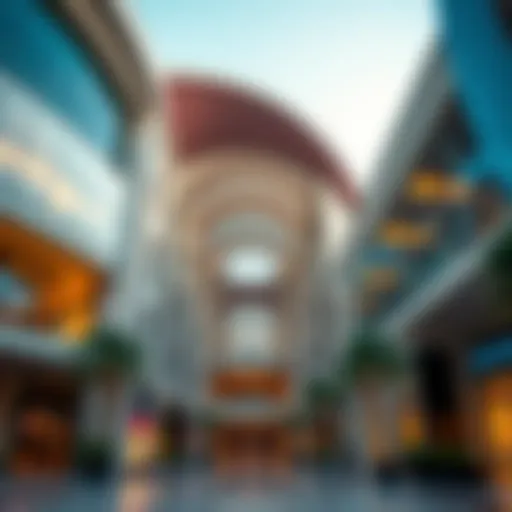Exploring Reviews of Private Schools in the Emirates
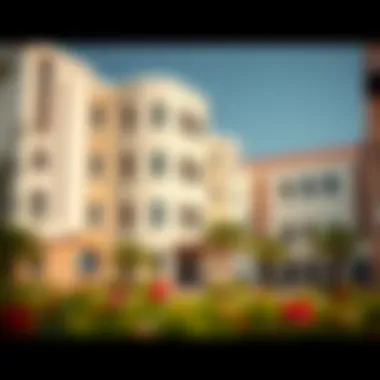

Intro
In the bustling educational landscape of the Emirates, private schools have come to represent not just centers of learning, but also havens for holistic development. With an increasingly diverse population of expatriates and locals alike, schools are tasked with catering to a plethora of needs. This article draws a closer look at the intricacies of private school reviews within this vibrant region.
Parents searching for the right school often rely on feedback from other families. They want to know what the real experiences are like rather than just the glossy marketing material. From the quality of the curriculum to the breadth of extracurricular activities, insights gleaned from reviews can greatly inform decision-making processes for families striving to find the best educational environment for their children.
This exploration will cover various aspects of the private schooling experience in the Emirates, aiming to detail crucial points like educational quality, extracurricular offerings, and levels of parent satisfaction. The goal? To arm potential students and their families with a comprehensive understanding of what these institutions have to offer, paving the way for informed educational choices.
The conversation will not just touch upon broad trends but will also dive deeply into local sentiments, providing a well-rounded picture for anyone contemplating the multiple facets of private schooling. In this way, families can embark on their educational journeys armed with valuable perspectives.
Emirates Private School Landscape
The landscape of private education in the Emirates is a rich tapestry woven from a variety of cultural, economic, and educational threads. Understanding this landscape is crucial for potential investors, agents, and homebuyers who wish to align their interests with the offerings of private schools in the region. As the demand for reputable educational institutions continues to rise, dissecting this landscape reveals essential insights into quality, accessibility, and market trends, ensuring informed decisions are made.
Overview of Private Education in the Emirates
The private education sector in the Emirates serves as a significant contributor to the overall educational framework. With a diverse population and an influx of expatriates from various cultural backgrounds, private schools cater to a multi-national student body. These schools offer a spectrum of curricula, including British, American, International Baccalaureate, and more localized options. With so many choices, families have considerable flexibility in selecting an environment that best suits their needs.
The market for private schooling here is competitive. Often, schools tout specialized programs in arts, sciences, and sports aiming to attract discerning families. Because consumer choices directly affect schools' growth trajectories, understanding parent preferences is particularly important. As a result, careful evaluation of reviews and feedback becomes integral, shedding light on where institutions excel and where they fall short.
Historical Context and Development
To grasp the current state of private education in the Emirates, one must consider its historical context. The Emirates' journey in educational reform began in earnest in the late 20th century. Initially, educational opportunities were sparse, often limited to public schooling. However, a paradigm shift occurred towards the early 2000s, fueled by an increasing population and a vision of a knowledge-based economy put forth by the government.
Investment in educational infrastructure escalated. As educational standards rose, several private institutions emerged, aiming to fill the gaps in quality and options that public schools could not fully address. Many of these schools were founded by international educational organizations, which brought with them established reputations and curricula. Over time, the private education sector has matured significantly, now featuring schools that not only meet but often exceed global educational standards.
"In the quest for excellence, private schools have established themselves as the alternative to public education, offering variety and specialized curricula that cater to the cosmopolitan population of the UAE."
Overall, the development of private education has been shaped by a blend of local and international influences. Understanding these roots helps stakeholders appreciate ongoing trends in school performance, educational governance, and parental involvement. By keeping a finger on the pulse of these dynamics, investors and families can navigate the educational terrain more effectively, ensuring they make choices that align with their educational ethos and expectations.
Factors Influencing School Reviews
The quality and reputation of private schools in the Emirates are often subject to intense scrutiny. Numerous factors influence school reviews, shaping the overall picture of what an institution can provide to its students. Parent expectations, student outcomes, and institutional outreach all play critical roles in how schools are perceived. It's not just about academics; it's an intricate blend of dynamic elements that can make or break a private institution's reputation.
A key aspect to consider is that the learning environment includes infrastructural components as well as curriculum standards. Parents repeatedly emphasize that finding the right educational fit for their child means assessing various elements critically. This article digs deep into some pivotal factors that deserve an in-depth exploration.
Curriculum Quality and Accreditation
Curriculum quality is a cornerstone of positive school reviews. Parents often seek schools that not only adhere to high educational standards but also embrace a curriculum that encourages creativity and analytical thinking. For instance, an institution that offers the International Baccalaureate (IB) program may appeal to parents aiming for a globally recognized educational pathway.
Accreditation is another vital piece of the puzzle. Accreditation assures parents that the school meets specific quality benchmarks. In the Emirates, schools like the American School of Dubai or the British School in Abu Dhabi often highlight their accredited status in marketing materials. This adds a layer of trust, reinforcing the belief that the school provides comprehensive and rigorous educational experiences.
“Choosing a school is akin to selecting a lifelong partner for your child's educational journey.”
So, schools that flaunt strong academic outcomes in standardized tests, along with feedback from credible educational assessments, tend to garner more favorable reviews. Parents are wise consumers; they usually research various factors before making a decision. Therefore, an accredited program—well-designed and executed—can elevate a school's standing markedly.
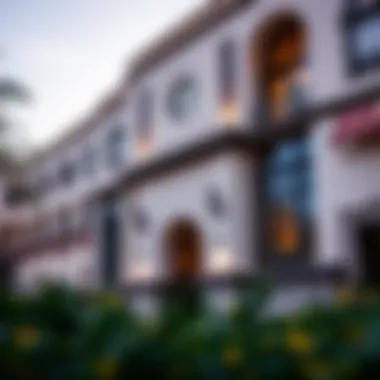

Facilities and Resources
The statement
Parent and Student Perspectives
Understanding the viewpoints of parents and students is crucial when exploring private education in the Emirates. Parents often play a significant role in selecting schools, seeking institutions that align with their expectations and values. Their feedback reflects not only satisfaction with academic performance but also the quality of extracurricular activities, teaching methodologies, and social environment. Meanwhile, students’ experiences provide valuable insights into day-to-day life at these schools, influencing their motivation and attitudes towards education.
In essence, perspectives from both parents and students contribute to a more comprehensive view of how effectively private schools meet diverse educational needs.
Survey Methodology
Gathering meaningful feedback involves a rigorous survey process that captures the sentiments of both parents and students. Surveys often employ mixed methodologies, combining qualitative and quantitative approaches. This might include structured questionnaires with Likert scales to gauge satisfaction, as well as open-ended questions that allow for detailed personal commentary.
- Surveys may target a representative sample across different demographics, ensuring diversity in responses.
- Data collection often occurs through online platforms or in-direct community outreach, making it easier for respondents to participate.
- Anonymity can encourage honesty, as parents and students may feel more comfortable sharing candid experiences without fear of repercussions.
This methodology is fundamental in understanding trending sentiments and drawing correlations between various aspects of the educational experience in the Emirates.
Common Themes in Parent Reviews
In examining responses from parents, certain themes frequently emerge. These recurring elements reveal what parents prioritize when evaluating a private school.
- Academic Performance: Many parents emphasize the importance of a strong academic record. Schools with consistently high test scores tend to rate positively in reviews.
- Communication and Support: Parents appreciate schools that foster open lines of communication. Regular updates and responsive staff play significant roles in their overall satisfaction.
- Community and Safety: A safe environment and a palpable sense of community can influence parental choices. Positive interactions with other parents further enhance their trust in the institution.
"The strongest factor for me was knowing my child is in a safe and understanding environment. That made all the difference," notes one parent reviewing a top-rated institution.
These themes not only inform prospective parents but also highlight areas where schools might improve to enhance satisfaction.
Student Experiences and Feedback
Students often have their unique take on the same experiences shared by their parents. Their voices are essential in shaping an accurate picture of life in private schools. From personal interactions with teachers to engagement in activities, students provide a candid account of their educational journey.
- Engagement in Learning: Students express their feelings about the level of engagement in lessons. Those in classes where teaching methods are dynamic and inclusive tend to report having a more positive viewpoint.
- Peer Relationships: Social dynamics play a major part in student satisfaction. Many students appreciate schools that encourage friendships and teamwork, leading to a supportive peer environment.
- Extracurricular Activities: Participation in clubs, sports teams, and artistic endeavors enriches student experiences, making schools more desirable according to their feedback.
Through their insights, students illuminate aspects of school life that statistics alone may not fully convey, emphasizing the holistic nature of education.
Each feedback facet from parents and students shapes a narrative that prospective families can use to navigate their schooling decisions. Understanding these perspectives is not just academic; it is essential for fostering a more responsive educational landscape.
Comparative Analysis of Schools
In the ever-evolving landscape of private education in the Emirates, conducting a comparative analysis of schools plays a pivotal role. This examination not only uncovers the nuances that define educational excellence but also assists families in making informed decisions about their children's future. Individuals seeking to enroll their children in private schools need insights that extend far beyond basic ratings. What sets one institution apart from another?
This analysis lays out the various factors that contribute to a school's reputation, including curriculum offerings, student-teacher ratios, and even extracurricular activities. Families often find themselves navigating a sea of information, and a comparative review helps to distill the key elements that matter most.
When assessing choices, potential students and their families can weigh quality against costs, consider the availability of specific programs, and evaluate the overall environment and ethos of each school. A thorough understanding of these aspects positions families to not just make a choice but to make the right choice.
Top-Ranked Private Schools in the Emirates
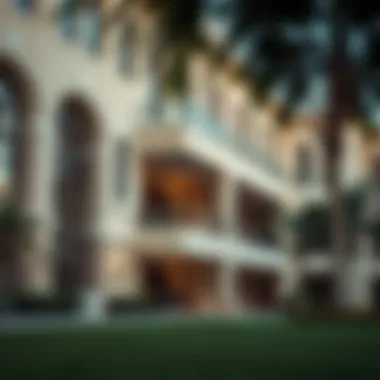

The Emirates is home to a number of prestigious private schools known for their academic rigor and holistic approach to education. Institutions like the International School of Choueifat and the GEMS World Academy consistently rank highly due to their proven records of success, both in standardized tests and university placements. With modern campuses and a diverse curriculum that often includes the International Baccalaureate, these schools attract families eager for a strong educational foundation.
Key Features of Top-Ranked Schools:
- Accreditation: These schools typically hold accreditation from respected international bodies.
- Diverse Curriculum: Offering British, American, and IB curriculums gives parents options that fit their child's learning style.
- Extracurricular Activities: A robust program of sports, arts, and clubs enhances the student experience, molding well-rounded individuals.
Emerging Institutions with Positive Reviews
While established schools have their merits, emerging institutions are carving out niches that capture the attention of discerning parents. Schools like the British International School and the Aldar Academies have been gaining traction, often due to their innovative teaching methods and smaller class sizes.
Parents are increasingly drawn to these newer institutions due to:
- Tailored Learning Experiences: Smaller class sizes often lead to more personalized attention.
- Responsive Curriculum Design: These institutions frequently adapt their curriculum to address current educational trends and the unique needs of their student body.
- Community Engagement: Emerging schools often place emphasis on building a strong relationship with families, fostering a sense of community.
Factors Driving Higher Satisfaction Levels
Several elements contribute significantly to elevating student and parent satisfaction levels in private schools. Understanding these factors can guide families in their choice.
- Quality of Teaching Staff: Skilled educators play a foundational role in student outcomes. Schools that prioritize hiring experienced teachers often see higher engagement and achievement.
- Parental Involvement: Schools that actively promote parent engagement create a collaborative atmosphere beneficial for students.
- Extracurricular Offerings: A well-rounded program that includes sports, arts, and clubs caters to diverse interests, fostering well-balanced development.
- Transparency in Communication: Schools that maintain a clear line of communication tend to build trust with families and enhance satisfaction.
In essence, the comparative analysis dives deeper than mere statistics - it presents a kaleidoscopic view of the educational landscape. As families ponder their options, understanding these elements enables them to navigate the myriad choices available in the affluent educational sphere of the Emirates.
"A well-informed decision today can pave the way for success tomorrow."
Through examined comparisons of schools, prospective parents can discern which institutions are genuinely committed to fostering an enriching educational environment.
Challenges Faced by Private Schools
Understanding the roadblocks private schools face in the Emirates is crucial for grasping the overall educational landscape. Every institution deals with its unique set of obstacles that can greatly influence the quality of education it offers. Though private schools often promote themselves as alternatives to public education, the realities can be much more complex. Investors, agents, homebuyers, and managers gain deeper insights when they comprehend these challenges. As they navigate the options available in the educational sector, a clear understanding of these issues equips them to make smarter decisions.
Funding and Resource Allocation
One of the pressing challenges for private schools in the Emirates revolves around funding and resource allocation. Schools often rely heavily on tuition fees, which can fluctuate depending on economic conditions. For instance, when economic downturns occur, parents may be forced to reconsider their expenditures, thereby affecting enrollment and revenue.
Investments in facilities and teaching materials become constrained during such periods, hindering the school's ability to provide cutting-edge educational resources. Additionally, competition among schools for financial support and resources can create disparities. Some institutions like Dubai American Academy can boast extensive facilities, while others may struggle to offer similar environments. This inconsistency leads to different educational experiences, which can drastically affect student outcomes. Schools need to find a delicate balance; without proper funding, they cannot recruit qualified teachers or maintain optimum learning atmospheres crucial for student success.
Regulatory Compliance and Standards
Regulatory compliance is another mountain that private schools must climb, impacting how they operate. The Emirates has specific educational standards and requirements set by authorities, such as the Knowledge and Human Development Authority (KHDA). Schools are required to undergo regular inspections and evaluations to ensure they meet quality benchmarks.
While this aims to enhance educational standards, it can also present difficulties. The procedural red tape can drain resources and time better spent on curriculum development and student engagement. Schools that fail to meet these rigorous standards might face repercussions including decreased enrollment and a tarnished reputation. This ongoing pressure to comply with regulatory demands can shift a school’s focus away from delivering individualized attention and fostering unique educational programs.
Adapting to a Diverse Student Body
Private schools in the Emirates also grapple with the challenge of educating an incredibly diverse student body. The population in the region comprises various nationalities, cultures, and languages, creating a melting pot of educational needs. While this diversity enriches the learning environment, it also complicates communication and curriculum development.
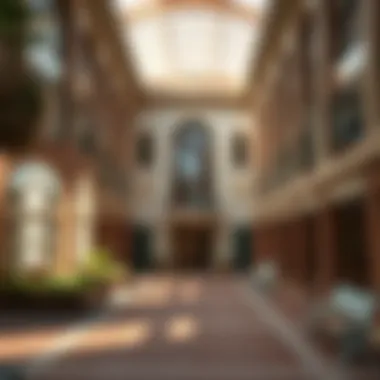

Educators must tailor their approaches to cater to different backgrounds, learning styles, and language proficiencies. For example, a student from an expatriate community may come from an entirely different educational system, leading to potential gaps in knowledge or skillsets. In this context, teachers find it essential to remain adaptable and understanding, often requiring additional training and resources to effectively address these varied needs.
"The challenge of a diverse student body is significant; however, it presents a unique opportunity for all involved to learn from each other and foster global understanding."
Finding the right balance between upholding high academic standards and accommodating a multifaceted student demographic remains a critical task for private schools. By investing time and energy into training teachers and developing inclusive programs, schools can create a richer learning environment.
Future Trends in Private Education
The private education sector in the Emirates is undergoing rapid transformation, shaped significantly by societal shifts, technological advancements, and evolving parental expectations. This section outlines the emerging trends that are likely to define the future of private schooling in the region, providing critical insights for stakeholders including investors, agents, homebuyers, and educational managers. The focus is on how these trends shape the landscape of education and the implications they hold for all involved parties.
Technological Integration in Learning
In today’s fast-paced world, technology has weaved itself into the fabric of education. The growing reliance on digital tools in private schools signifies a critical shift in teaching methods and student engagement. Students are no longer solely dependent on textbooks; they harness the power of World Wide Web resources, interactive platforms, and learning management systems.
- Interactive Learning: Tools like Google Classroom, Microsoft Teams, or educational apps like Kahoot! are not just buzzwords but pivotal in creating a participative learning atmosphere. Teachers facilitate discussions and group activities in formats that encourage active involvement.
- Accessibility: Technology increases accessibility for students with diverse learning needs. Tools and software cater to various learning paces, ensuring all students have a chance to thrive, making it an inclusive environment.
- Real-World Application: With virtual labs, simulation software, and augmented reality experiences, students can interact with course material in ways that were inconceivable a decade ago. Such integrations lead to deeper comprehension and retention.
Evolving Educational Standards
The educational standards within private schools are not static; they continuously evolve in response to global best practices. Schools are at the vanguard of adapting these standards, which often include a shift towards competency-based learning and ensuring curricular relevance to market demands.
- Career-Relevant Skills: Programs that integrate entrepreneurship and critical thinking into everyday learning are sprouting. Students are being equipped to meet tomorrow’s job market, which increasingly values adaptability and innovative problem-solving.
- Global Benchmarking: The competitive nature of private education in the Emirates encourages schools to reflect on international standards, such as those set by the OECD. This improves the overall educational framework, fostering an environment where high academic achievement is the norm.
- Feedback-Driven Improvements: Schools are increasingly employing mechanisms to regularly solicit both student and parent feedback, using insights to drive curriculum adjustments. This ensures that the educational offerings remain aligned with community values and expectations.
Increased Focus on Holistic Development
In recent years, there has been a marked inclination towards fostering the holistic growth of students. This paradigm shift views education as not just an academic endeavor but a multi-faceted approach that nurtures emotional and social skills alongside intellectual development.
- Emotional Intelligence: Schools are placing emphasis on social-emotional learning (SEL), teaching students to manage their emotions, set positive goals, and establish supportive relationships. Programs aimed at building resilience and empathy are becoming integral parts of school curricula.
- Extracurricular Engagements: Beyond academics, private schools are expanding their extracurricular offerings, providing students with opportunities to discover and hone their talents. Whether it’s drama, sports, or community service, these programs play a vital role in shaping well-rounded individuals.
- Community Involvement: Schools are increasingly involved in their local communities, enabling students to participate in outreach, volunteering, and civic engagement activities. These programs foster a spirit of responsibility and awareness, preparing students to contribute positively to society.
The convergence of technology, evolving standards, and a holistic approach represents a significant altitudinal shift in how private education is perceived and delivered. Investors and stakeholders must recognize these trends as not just fads, but as cornerstones that will define the educational landscape of the future.
In summary, the trends discussed herein are not isolated developments. They underscore a larger movement toward enhancing private education in the Emirates, aligning it more closely with global standards while being rooted deeply in local values.
Concluding Reflections
In analyzing the landscape of private schools in the Emirates, the concluding reflections serve as a vital component of this discussion. It’s not merely a wrap-up, but an opportunity to crystallize the insights gained, presenting a vantage point that helps stakeholders make informed choices. Understanding the intricacies of school reviews, along with their implications, offers substantial value to families, educational authorities, and investors alike.
This section is essential as it ensures that key findings resonate with purpose. For parents searching for the ideal educational setting for their children, clarity is paramount. Similarly, investors and agents become more attuned to market demands when the perspectives of those directly influenced by education quality are effectively communicated.
To sum up the crux of the analysis, addressing the challenges schools face alongside their merits in reviews enriches the conversation. By weaving experiences shared by parents and students into the closing remarks, a richer tapestry emerges—one that highlights not only the achievements of various institutions but also the areas requiring attention and improvement.
Summary of Key Findings
The review process has uncovered several key themes:
- Curriculum Excellence: Many schools are highly regarded for offering internationally recognized curricula like the British or IB systems. Parents especially flag these accreditations as differentiators.
- Extracurricular Programs: Active engagement in extracurricular activities is a recurring theme in positive reviews. Schools that promote sports, arts, and community service tend to enjoy higher satisfaction levels.
- Teacher Competence: Qualified and dedicated educators remain a central concern for parents. Reviews overwhelmingly indicate that teachers with relevant experience significantly enhance students' learning outcomes.
- Facilities and Resources: Modern infrastructure and comprehensive resources contribute positively to the learning environment, often highlighted in favorable reviews.
This amalgamation of insights points to a progressive private education landscape that prioritizes quality and satisfaction.
Implications for Future Decisions
As families consider their choices, the information gathered here bears significant weight. The implications are multifaceted:
- Enhanced Decision-Making: Parents equipped with current insights can better assess which schools align with their educational values and expectations.
- Investment Opportunities: For investors and educational managers, understanding the nuances of school reviews can signal promising ventures or potential pitfalls.
- Policy Improvements: Educational administrators might benefit from the trends highlighted, fine-tuning existing policies to address areas requiring enhancement.
- Community Engagement: Schools that actively participate in character-building programs and community service tend to garner more substantial parental support, fostering a collaborative school culture.



